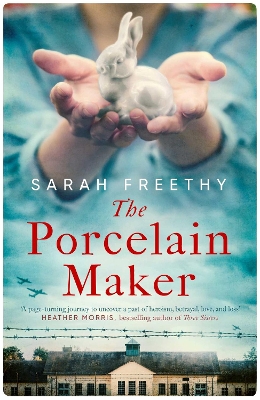
chymerra
Important things you need to know about the book:
Pace: The pace of The Porcelain Maker was medium throughout most of the book. It did speed up towards the end (when Bettina tried to flee Germany with Max).
Trigger/Content Warning: The Porcelain Maker contains content and trigger warnings. If any of these triggers you, I suggest not reading the book. They are:
- Antisemitism (graphic)
- War and War themes (graphic)
- Violence (graphic)
- Classism (moderate)
- Dementia (moderate)
- Depression (moderate)
- PTSD (moderate)
- Alcohol Consumption (moderate)
- Dead Bodies (moderate)
- Suicide (minor)
- Starvation (moderate)
- Grief (graphic)
- Confinement (graphic)
- Gun violence (moderate)
- Murder (graphic)
- Concentration Camp (moderate)
- Genocide (moderate)
- Mass Murder (moderate)
- Abusive Relationship (minor)
- Mental Health Hospitalization (minor)
Sexual Content: There is sexual content in The Porcelain Maker. It was not graphic.
Language: There is moderate swearing in The Porcelain Maker. But there is offensive language used (slurs against Jewish people).
Setting: The Porcelain Maker is set in several locations. In Bettina and Max’s section of the book, the locations were various parts of Germany. In Clara’s book sections, the settings were Cincinnati, London, and Germany.
Tropes: War, Combining Real and Fiction Events, Including Historical Figures as Characters, Dual Timeline, What Life was Like, Survivor’s Guilt, Death Used as Catalyst, Bittersweet Ending, Alternation POV, Trauma
Age Range: I recommend The Porcelain Maker to anyone over 21.
Plot Synopsis (as spoiler-free as I can get):
Max and Bettina fall in love in the golden years between World War I and World War II. But, with the rise of Nazism, Max is soon captured and thrown into Dachau. What saves him from manual labor is an unexpected friend he had made at Allach’s famous porcelain factory and his talent for creating porcelain figures. Desperate to save Max, Bettina will do anything to save him. That includes planning a daring escape from Allach with Max. Will that escape happen?
Desperate to find out her father’s identity, Clara starts on a journey tracing her roots with the sparse clues her mother left her. But, what Clara discovers will shake her to her core and make her question everything she knew about her mother. Will Clara find out who her father is? And why didn’t her mother tell her?
Main Characters
Max Erlich: I liked Max. He truly loved Bettina and was willing to step back to let her shine. I was enraged with how he was captured (I was yelling at my Kindle). Then, I knew his plotline would go two ways: a happy ending way or the way that would shatter me (and Bettina). So, I wasn’t surprised by how it ended.
Bettina Vogel: This woman was strong. She knew her mind from the beginning and wasn’t about letting anyone tell her what to do. She had a plan to get out of Germany before Max was captured. But, when he was arrested, her plan had to be adjusted a bit. I disagreed with her marrying the SS guy, but I understood why she did it. What I didn’t understand was her after World War II. What was done to her messed her head up, but willingly not telling her child something that important made me scratch my head. Still, regardless of her choices, I liked her a lot.
Clara Vogel: I felt terrible for Clara. At times, she was chasing shadows and rumors about her father. I liked that her doggedness got her answers. That scene at Dachau, talking to a Holocaust survivor and looking at records, gave me chills.
My review:
When I started to read The Porcelain Maker, I was expecting it to be like other World War II/Nazi Germany books. The main character is captured by the Nazis, forced into concentration camps, and either done to them or seen horrendous things. But not in this case. In this case, while the horror of Dachau was there, it was muted and kept in the background. Which is what made the violence and racist remarks that Max endured at the porcelain factory even more shocking.
This book was an emotional read for me. I grew up in a predominantly Jewish community in Massachusetts. Several of my neighbors, friends, grandparents, and teachers survived concentration camps during World War II. Nothing was talked about, and seeing those inked, blue numbers wasn’t out of the ordinary for us. It wasn’t until a local woman started talking to the middle and high school about the Holocaust and what she endured that I truly got a sense of what happened.
The Porcelain Maker has three separate storylines. Those storylines follow Max, Bettina, and Clara. Max and Bettina’s storylines merge at the beginning of the book, but they separate once they move to Allach. Each storyline was well-written, and each had its twist that surprised me.
The storyline with Max affected me the most. I genuinely liked him and wanted everything to turn out well. But, after he moved to Allach with Bettina, I felt that everything that happened to him (and to her) was predestined. I wanted to change how the author wrapped up his storyline. I wasn’t surprised, but it wasn’t something that I wanted to happen.
The storyline with Bettina also affected me. As I said in her character section, I thought she was strong. Once the Nazis put Max into Dachau, everything she did was to protect her baby and, ultimately, to work towards seeing Max again. Did I agree or like everything she did? No, but I did understand. I also understood why she was so broken in Clara’s recollections. Living through something like that and with what was done to her would scar anyone.
The storyline with Clara intrigued me. I liked seeing her journey to finding out who her father was. What I liked even more was that the author set the storyline in 1993. There were few computers or internet access back then (I remember using dial-up in 1994 or 1995 for the first time). Clara had actually to do the research. I liked how she got one tiny breadcrumb after another, eventually leading to someone who knew her father. I won’t lie; I did get emotional while reading her storyline. I got all the emotions and then some.
The end of The Porcelain Maker was perfect. I won’t say anything about what was written except that I liked it. And the epilogue was just as good. Talk about a tribute!!!!
Many thanks to St. Martin’s Press, NetGalley, and Sarah Freethy for allowing me to read and review this ARC of The Porcelain Maker. All opinions stated in this review are mine.
